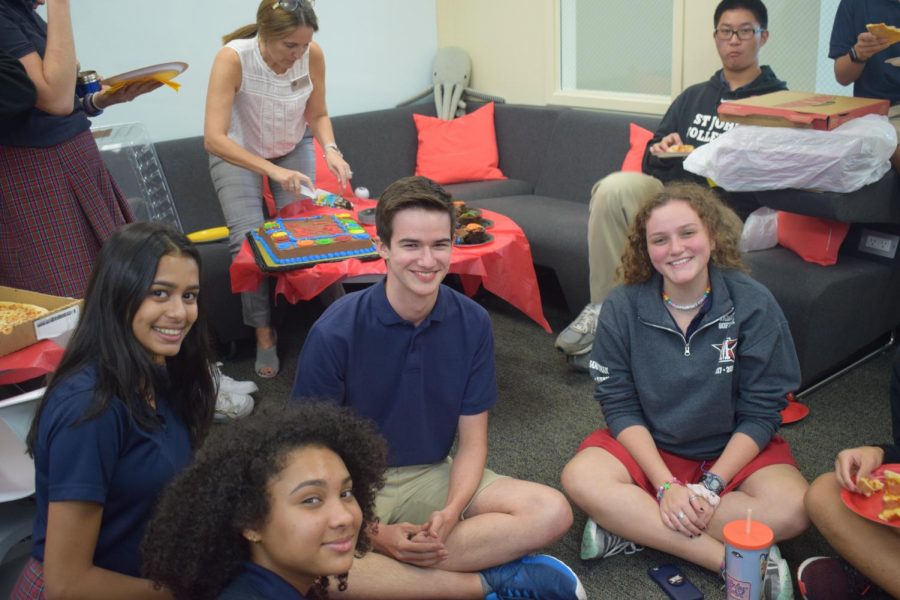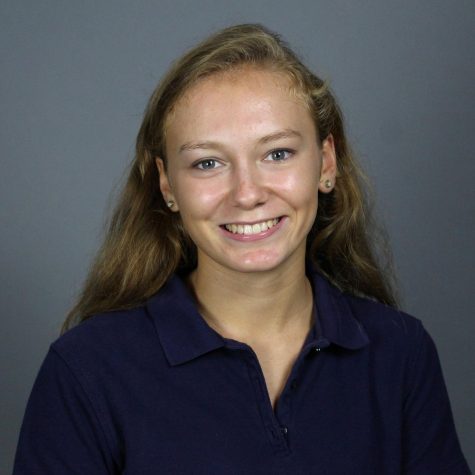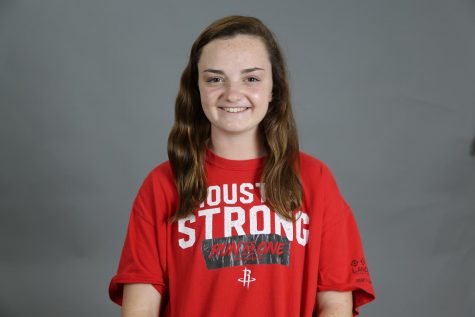New sophomores travel overseas to join SJS
Wiesinger’s classmates throw him a welcome party.
September 10, 2018
The commencement of the school year is a time of stress, adjustment and unfamiliarity for many students. The accommodations that sophomores Moritz Wiesinger and Emile Vlahos had to make, however, far outweighed those met by most SJS students.
Wiesinger, a foreign exchange student, arrived in Houston from Dortmund, Germany, just four days before school started with only two suitcases.
Last year, Wiesinger underwent a complicated application process through Assist, a nonprofit organization that matches academically talented international students with American independent schools. Less than a year later, he was placed in Houston for an entire school year abroad.
For him, the initial shock factor about St. John’s was not at all related to culture or lifestyle, but simply the number of classes students are required to take.
In Dortmund he attended Helene Lange Gymnasium, and while he only had three to four classes per day, he took up to 14 classes a year, including multiple sciences, geography, politics, music, art and various electives. His class load in Germany differed from its more focused St. John’s counterpart, which is laced with free periods and sets a maximum class number at six.
“I think that it is good to take fewer classes and meet more often because when you only have physics, chemistry or biology once a week, you don’t really learn that much,” Wiesinger said. “When you have it four or even five times a week, you can do way more and be much more consistent.”
A well-rounded student, Wiesinger swam for a club team in Germany and plans to swim for SJS. He also plays volleyball in the fall and enjoys playing his electric guitar—which is being shipped from Germany—and the piano.
He is staying with the Boyles, who reached out to the school and offered to host an exchange student.
“The whole point of being a host family is to act like a normal American family, so that is what we do,” junior Ian Mayral Boyle said. “We both like to watch soccer together.”
Being from Dortmund, the home of one of the best-ranked teams in the Bundesliga, Wiesinger said it is nearly impossible not to like soccer.
Similarly, Vlahos, whose family moved here from London about a week before school, compared the hype of soccer in England to that surrounding American football. Vlahos played soccer in London and plans to play for SJS during the winter season.
In a true embrace of his new American home, he also tried out for the football team and plans to run track in the spring. Along with sports and studies, he enjoys computer coding and even attempted to invent an app with his friends in London.
Vlahos is not completely new to living in the States. He was born in New York and lived in New Jersey for a few years before moving to England to be closer to his parents’ families, who live in England and Greece.
When his parents wanted to move back to America, they settled in Houston because they spent three weeks here last summer and already have a few friends who live here.
“It really was the best time for us to move here because if we had stayed, I would have taken GCSEs this year, and that would have really restricted our options to move,” he said.
GCSEs, or General Certificates of Secondary Education, are standardized subject tests that are taken in the British equivalent of Grade 10 and are an important stepping stone to getting jobs or continuing education.
Much like Wiesinger, Vlahos took a wider variety of courses per year while attending Alleyns, a day school in southwest London. Including electives, he took around 10 classes per year.
According to Vlahos, apart from school, one of the biggest differences between the two cities is that Houstonians are much nicer.
“When we were moving into our apartment, lots of people stopped and offered to help us move,” he said. “If we were in London, people would never do that because they all have somewhere to be.”
Both Vlahos and Wiesinger noted that Houston is much more widespread than either of the European metropolises they come from, and the collective architecture seems to be more modern than that of London or Dortmund.
They also demonstrated outright that people’s differences are far outweighed by their similarities, even when everything about them—countries, language, government, cultures or traditions—seem to be unalike.
“The culture is not that much different, and since I am staying with the Boyles, it is pretty much the same as home,” Wiesinger said. “There is not even that big of a difference between the mannerisms of Americans and Germans.”






